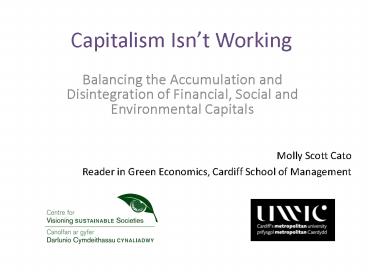Capitalism Isn PowerPoint PPT Presentation
Title: Capitalism Isn
1
Capitalism Isnt Working
- Balancing the Accumulation and Disintegration of
Financial, Social and Environmental Capitals
Molly Scott Cato Reader in Green Economics,
Cardiff School of Management
2
Argument of the Paper
- In the words of the protestors banner,
capitalism isnt working in two specific
senses first, it is failing to share the
proceeds of economic activity fairly, and is thus
creating inequality, social dis-ease, and a
failure of incentives. Secondly, and partly as a
result of this primary failure, it is failing in
an environmental sense. - I make this case by using the Five Capitals
Framework
3
Loss of Values
- Art critic Alastair Sooke tracks down the ten
most expensive paintings . . . Gaining access to
the glittering world of the super-rich, Sooke
discovers why the planet's richest people want to
spend their millions on art.
4
Loss of Control
- The most striking revelations in the 322-page
prospectus launched the Glazer family last week
to seek 500m in new bond loans for Manchester
United were the five short paragraphs detailing
the millions of pounds the family is personally
taking out from the Old Trafford football club.
5
What is financialisation?
- The financial growth of the past few decades
does not represent a subordination of public
authority and political capacity to the
expansionary forces of global financial markets
but has rather been a process whereby new
organisational linkages were forged and
particular relations of institutional control
were constructed and consolidated. Fundamentally,
financial expansion is a process of
institutionalisation whereby the web of
capitalist power is cast over a wider set of
social relations and becomes more rather than
less rooted and organically embedded in the
fabric of social life.
6
- Expansion of financial markets the ratio of
global financial assets to global GDP has risen
three times, from 1.5 to 4.5 - Sucking of capital into speculative circuits and
away from the real economy - Expansion of complex financial instruments
- Companies focus on their financial activities and
leverage borrowing on their own account - Increasing power and wealth of rentier class
(their share in the US increasing from 16 of
domestic corporate profits during 1973-85 to 41
in the 2000s Johnson, 2009) - The artificial extension of consumption through
expansion of credit/debt - Penetration of financial techniques and culture
into a wider area of life
7
Domination by the closed circle
- those UK bodies reporting on the financial
system, and how better to regulate it, drew upon
a membership of 662 years of work experience and
75 of those years were spent servicing City
needs - 90 of its witnesses came from finance or
consultancy with revenue links to finance. . .
Membership contained no non-financial businesses
and their trade associations, no trade unions
despite the unionisation of retail finance
workers, no NGOs to represent consumers or press
social justice agendas, no mainstream economists
or heterodox intellectuals, very few politicians
or civil servants
8
Co-operatives and Mutuals
- It was precisely the exclusion of working people
from the exclusive circuits of capital and their
prevention from accumulating capital and thus
power to create their own businesses that was one
of the guiding principles of co-operative
enterprise
9
Balancing Producer and Consumer Demands
- A key feature of the co-operative movement
- The demands of capital are now dominant
- Can we find a way to also include nature in the
negotiation?
10
Pressure to degenerate
- Excluded from capitalist credit circle
- Mondragon and the Caja Laboral
- Building society demutualisations their share of
the mortgage market over this time went from 80
in 1994 to only 25 by 1999 - Private equity firm J. C. Flowers has taken a
stake in Kent Reliance Building Society
11
Five Capitals Model
12
Type of capital Description
Financial Comprised of shares, bond, or banknotes and useful to facilitate exchange of the other capitals. Has no intrinsic value
Manufactured Infrastructure created by human effort
Social Civil society organisations and the relationships of trust they create
Human Health, knowledge, skills, motivation and spiritual ease of individuals
Natural The environment, the resources available in the environment, and the natural systems it provides that support life
13
Substitution of capitals?
- Natural capital (say, petroleum) can be expended
so long as this is compensated for by an
increased level of physical or even financial
capital - Ecological and green economists defend the
primacy of natural capital. While technical
improvements can lead to more efficient use of
resources, the substitution of capital for
natural resources is problematic. - Is the term natural capital itself problematic?
14
How the global economy really works
15
- the environment has been reduced to a supply of
resources and human capital is defined in its
more usual sense of a skilled workforce.
Manufactured capital is now portrayed in the
limited sense of essential infrastructure to
support production, while social capital is
considered as a shared culture that enables the
efficient combination of the other capitals. This
representation of the global economy as currently
structured is far from the ideal of the five
capitals framework, and equally far from the
ideal of the co-operative founders
16
Balancing the Extraction and Sharing of Value
17
An Example of Balance Woodland
- Pricing the rainforest and offsetting carbon
emissions by paying for it to be preserved - Sustainable use of wood via a woodland
co-operative - Economies of scope via verticial diversification
- Local control
- Value stays in the local economy
18
A Balanced Economy
19
Environmentally focused thinktank
- Sharing ideas about the new paradigm
- Launching in London on 21st July
- Initial papers on Environmental Citizenship and a
Green Approach to Welfare
- www.greenhousethinktank.org
20
Find out more
- www.greeneconomist.org
- gaianeconomics.blogspot.com
- Green Economics An
- Introduction to Theory, Policy
- and Practice (Earthscan, 2009)
- Environment and Economy
- (Routledge, 2011)

